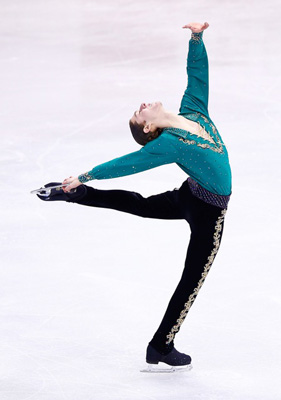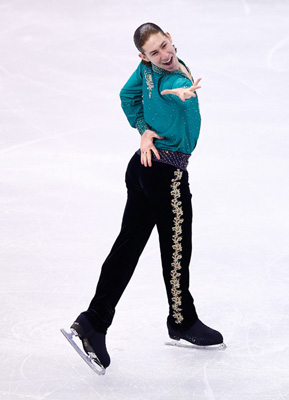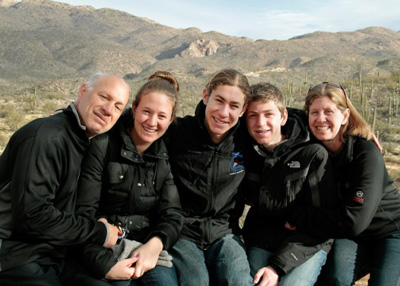Olympic dream come true
Permanent link All Posts
Highland Park native Jason Brown performs his “Riverdance” program at the U.S. Figure Skating Championships in Boston, Mass. He finished in second place.
Nineteen-year-old Highland Park native Jason Brown is an Olympian. Brown earned a spot with a second-place finish at the U.S. Figure Skating Championships in Boston on Jan. 12. His “Riverdance” program won the crowd over, dazzled the judges, and has garnered more than 2.7 million views on YouTube.
Although he’s been skating since he was about 4 years old, Brown, with help from his parents, Steve and Marla, also set aside time growing up for connecting with Judaism and the Jewish community. He attended Hebrew and religious school at Congregation Solel in Highland Park through his Confirmation year and went to Jewish summer camp at Olin Sang Ruby Union Institute (OSRUI) for five summers.
Brown spoke with Oy!Chicago about his viral success, balancing his commitment to Judaism with his skating ambitions, and what he’s looking forward to at the Sochi games this month.
Oy!Chicago: Now that you’ve had some time for it to sink in, what has been your feeling and reaction so far to all this excitement?
Jason Brown: I went to Nationals really well-trained and ready to put out two clean skates and that’s what I’ve been working so hard this whole year to do, so it was not surprising to me that I was able to do it. What I think has been out of this world is the reaction afterwards … the magnitude of what happened I did not ever expect. I cannot express how fortunate, and lucky and blessed I feel. I can’t even express the amount of people that have reached out to me, I can’t even put to words – I really can’t.
Have you received any funny or crazy reactions since you “went viral”?
So many people are Tweeting at me or writing about me that they’re not into skating and I got their attention, and I think that’s something that is a skater’s dream because you want to expand the sport, you want non-skating fans to become skating fans and that definitely took me by surprise and means so much to me. The Riverdance cast wrote me, which is just the most insane thing in my life. They’re such inspirations to me … Today I got a Tweet from Bill Whelan who composed the music of Riverdance. I don’t even know how to respond. It’s so beyond anything I ever thought would happen. It’s beyond even if I skated my best, it’s not what I thought would happen.

Highland Park native Jason Brown performs his “Riverdance” program at the U.S. Figure Skating Championships in Boston, Mass. He finished in second place.
A lot of people have praised you for being a great performer. Is that what you think is really drawing people in and causing this reaction?
For me, I love to perform and I love to perform for the audience, to the audience, at the audience. I think that’s something I’ve always loved to do since I was little. I think because I don’t have the biggest technical marks, I work so extremely hard in every other aspect in skating and I love it so much … Nothing makes me happier than to know that the audience enjoyed it and had a good time watching it.
When did you know that skating was more than just an activity for you?
I went through a two-year period where I told [his coach, Kori Ade] I didn’t want to compete again; I got so nervous being in front of a crowd. My coach, I love her to death – she’s literally my second mom – somehow turned me around mentally and showed me the joy that competing and performing brings. From there she started to take me to different training sites all over the country and that was really inspiring … It was about 2006 in those Olympics when I first was like, “this could be something I really want to do.” When I was 11, I won the juvenile title and that is when I started to believe, “let’s see where I’ll go,” that’s when I became a bit more serious. As the years went on, that drive to train and become more dedicated kept growing.
What Jewish experiences do you feel have influenced you?
I went to OSRUI for five years and I think their support through it all—they allowed me to go for three weeks or two weeks [of a four-week session] and leave, they even let me come back for the last couple of days. I wasn’t able to take that much time off [of skating]. Just the family atmosphere ... I have so many memories at that camp. Growing up, I went to Hebrew school until I was a sophomore and I read Torah at confirmation. Being part of that community and having their support means so much to me … The Jewish community and that feeling is something that I can’t be more grateful for.
What was it like trying to balance skating with a commitment to Judaism?
There are times when you have to start to give up things because you can’t do it all. I think what was so great was having the balance made me so much more of a well-rounded person. I was able to have a life outside of the rink. Skating never defined who I was, and it still doesn’t to this day and I can’t thank my parents enough for that. I wasn’t always forced to be at the rink, and having that balance made me a more balanced person and athlete.

The Brown family on vacation in Arizona (left to right): Steve, Jordan, Jason, Dylan and Marla.
What is your mindset heading into the Olympics?
I’m just taking it like I’d approach any competition. I’m going to do the best that I can and just train really hard and take it day by day. That was my mentality for Nationals and that’s a mentality I’m going to keep for the Olympics. That’s where [my and Kori’s] focus is – training very consistently and keeping it very schedule-oriented, just do your job every single day.
Any athletes you’re looking forward to meeting?
I think it’s going to be so incredible to be around so many athletes of so many different sports. People like Shaun White, to actually see them in person, or Bode Miller. I think that’s going to be insane. It’s crazy that I’ll be there when the U.S. hockey team is playing and the speed skaters – Shani Davis – those are the type of experiences that I’m so excited to have because I’ve seen them on TV for so many years and it’s like, wait, I’m going to be there? It doesn’t register yet. I don’t know when it will, if it ever will.
You have such a big support network of family and friends who saw you perform at Nationals and have reached out to you since. What has that meant to you?
There’s nothing more important to me than family and family friends, the people you surround yourself with. I couldn’t have asked for a better support system. They’ve all been there at my lowest lows; they’ve been there at the moment with the highest highs and they’ve never stopped believing in me … Sometimes it’s hard as an athlete; in any sport there are times when you fail, there are times when you don’t succeed. I know there are some athletes if you don’t succeed your family and friends say that wasn’t good enough. I never ever get that. It’s learn from it, grow from it and keep going. They’ve never stopped being proud of me and it means the world to me.



.jpg)



